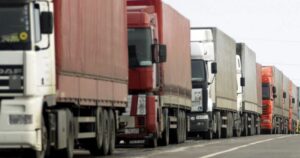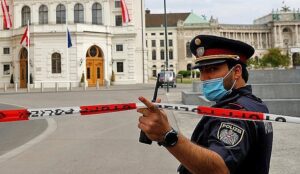
In Odessa and the region from July 10 introduce summer restrictions for trucks, movement is allowed from 6:00 pm to 10:00 am, reported the press service OVA.
“We remind you that from (10.07.2023) in order to preserve the road surface during the hot season come into force summer bans on the movement of trucks from 10:00 to 18:00,” – said in the telegram channel of the head of the Odessa OVA Oleg Kiper.
From 18:00 to 10:00 movement of freight transport is allowed, stressed in the OVA.
As noted, the restriction of traffic will act on the highways M-15 /Odessa-Reni /, M-05 /Kiev-Odessa /, M-14 /Odessa-Melitopol/ within the Odessa region for heavy vehicles with a total weight of over 24 tons and loading on the axle 7 tons.
“Exceptions are specialized purpose vehicles and vehicles transporting dangerous, perishable goods, live animals and poultry; goods related to the prevention or elimination of the consequences of emergencies; military goods, dual-use goods and/or property used for the needs of defense; humanitarian aid; people,” the OVA stressed.
In the department reported that also allowed the movement of vehicles engaged in international transport of goods, provided that the driver of the truck has a reserved place in the waiting list to cross the state border of Ukraine for road transport means of the electronic system (“eOrder”) two days before the waiting list for the next time.
At the same time, engaged in the transportation of grain, oilseeds and fuel and lubricants businesses are advised to contact the Odessa OBA for consultation and subsequent receipt of passes during curfew by phone: (048) 718 93 87, (048) 718 95 20.
“The consultation will be carried out from Monday to Friday from 09.00 to 18.00. In order to properly organize the issuance of passes, the relevant documents should be sent to the email address ytsatskoi@od.gov.ua,” explained in the administration.
It is noted that the observance of truck drivers and the requirements of road signs will be controlled by the territorial division of Ukrtransbezopasnost together with law enforcement officers.
It is also reported that at the same time the Service of restoration and development of infrastructure in the Odessa region will ensure the establishment of appropriate prohibitive and informational road signs and determination of places for placement of special sites or parking of heavy and/or large vehicles for the period of the special regime.

The National Securities and Stock Market Commission (NSSMC) on Thursday adopted Decision No. 1053, which canceled almost all restrictions on capital and commodity markets introduced since the start of the full-scale Russian invasion.
“The step to unblock the capital and commodity markets is timely and balanced, because market participants have confirmed their readiness for the development of the financial sector,” Prime Minister Denys Shmigal said in a statement from the National Securities and Stock Market.
According to him, even before the war, the renewal of the stock market was identified as one of the government’s priority initiatives.
“After our victory, the development of capital markets and commodity markets may become one of the drivers for the recovery of the economy and Ukraine as a whole,” the prime minister said.
Ruslan Magomedov, the head of the National Securities and Stock Market Commission, noted that during the five months of the war, the capital markets and commodity markets worked in manual mode.
“The regulator carefully monitored and analyzed the results of each authorized operation. In civilian life, this is nonsense, but the war dictated its conditions. Thanks to an individual approach and a prudent position, we were able to overcome panic, preserve assets and prevent defaults on a number of securities,” he said. head of the regulator.
The decision comes into force on August 8 this year, the document states.
According to it, the bans remain in relation to transactions related to individuals and legal entities of the Russian Federation and Belarus.
In addition, settlements on the second part of the REPO operation under REPO agreements concluded before the start of the war, as well as applications for redemption from participants in joint investment institutions of open and interval type, are allowed only from August 22, and for earlier transactions, permission from the Commission is required.
As reported, the Verkhovna Rada last week adopted a law “on the specifics of the activities of the financial sector in connection with the introduction of martial law in Ukraine” (No. 7465-1), which makes it possible to ease these restrictions. However, this document has not yet been signed by the president, according to the information on the website of the parliament.

This summer, the State Agency for Highways of Ukraine (Ukravtodor) does not introduce seasonal restrictions for trucks with a total weight of up to 40 tons during the daytime at elevated air temperatures.
According to the agency on its Facebook page on Tuesday, this decision was made primarily due to the war in the country, the reorientation of exports to the road network and significant changes in logistics.
“Before the full-scale invasion of Russia, Ukraine exported mainly by sea. Now, due to the blocking of ports, the country has redirected the flow of goods to rail and road. We understand the importance of logistics today, therefore, in order to avoid interruptions in the transportation of vital goods, seasonal restrictions are not introduced this year” , the ministry said in a statement.
At the same time, Ukravtodor reminds drivers and carriers that the movement of trucks must be carried out in compliance with weight parameters both in terms of total mass and axle load at any time of the day. According to the norms, the maximum weight of a cargo vehicle for transportation on the roads of the country is 40 tons.

From May 16, Austria removes all coronavirus-related restrictions for foreign tourists, they will no longer need to present a vaccination certificate, a certificate of illness or a test upon entry, the country’s official tourism portal reports.
The so-called 3-G rule (presence of vaccination, certificate of past illness or negative test) is removed from May 16 for those entering Austria from all countries.
Since April 16, many “covid” restrictions have been lifted in Austria. Thus, a vaccination certificate, masks and tests are not required to enter most public places, restaurants, bars and museums. The requirement to wear masks at all times has also been lifted, but they remain mandatory in hospitals, supermarkets and public transport.

The Ministry of Infrastructure of Ukraine and the Ministry of Transport of the Republic of Malta have agreed on the mutual lifting of restrictions on regular air traffic between the two states.
The agreement, in particular, provides for the removal of restrictions on: the number of designated airlines, points of departure/destination in the territories of both countries, the number of flights with regular air traffic, the Ministry of Infrastructure reported on Facebook.
The new agreement is expected to increase the number of flights between the countries, as well as positively affect the cost of air tickets.
The ministry also recalled that in October Ukraine and the EU are planning to sign the agreement on Common Aviation Area (ECAA). Thanks to this, Ukraine will fully enter the common airspace of the EU, and the practical result of the agreement will be to expand the geography of flights and reduce the cost of tickets.
Earlier, executive director of the Irish airline Ryanair Michael O’Leary said that the company is planning an aggressive expansion in Ukraine after joining the EU Open Skies Agreement. According to him, Ryanair expects to operate flights from 12 airports in the country, which are already technically ready.

The Interdepartmental Commission on International Trade on August 5 made a decision to revise special measures that are coming to completion – quotas in relation to the import of sulfuric acid and oleum to Ukraine (foreign economic activity code 2807 00 00 00).
According to the commission’s publication in the Uriadovy Kurier government newspaper, the initiators of extension of the special measures were Skhidny (Eastern) Ore Mining and Processing Plant, PJSC Sumykhimprom, Scientific and Production Enterprise Zorya and First Chemical Association.
“The commission found that the appeal contains enough information indicating that the use of special measures had a positive effect on the applicants’ activities, but did not completely eliminate the consequences of the harm caused to them, the appeal provides enough information indicating that the applicants may be in the process of adapting to conditions of competition,” the report says.
The Ministry of Economy has been entrusted with the revision of the restrictions, and it carries out the registration of interested parties by August 13.
As reported, in the summer of 2018, the commission introduced quotas for these products for three years. For the first year, the import quota for sulfuric acid and oleum from Belarus amounted to 30,800 tonnes, Russia – 8,600 tonnes, other countries – 4,300 tonnes. In the second year, quotas were increased, respectively, to 32,300 tonnes, 9,100 tonnes and 4,500 tonnes, in the third year – to 33,900 tonnes, 9,500 tonnes and 4,800 tonnes.
The special measures do not apply to imports from about 50 countries, including Kazakhstan.
A number of Ukrainian metallurgical companies opposed the introduction of restrictions on the import of sulfuric acid, while chemical enterprises insisted on their introduction.